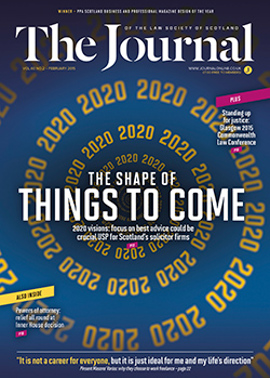Ivor Guild: an appreciation
Ivor Guild, who died early in January a few months short of his 91st birthday, was one of the best known and respected solicitors of his generation. He was a partner in Shepherd & Wedderburn for 44 years, but his interests extended far beyond the confines of his practice into many aspects of public life.
He was prominent in the business community, having been a director and chairman of several leading investment trusts. He held a number of high offices in the Scottish Episcopal Church, and he was procurator fiscal to the Lyon Court for 34 years. He served on several government committees, including the Council on Tribunals, being chairman of its Scottish Committee, and he was a member of the Interception of Communications Tribunal.
Ivor was born in Dundee in 1924, the son of a stockbroker. He was educated at Cargilfield and Rugby. Being assessed as medically unfit for military service, on leaving school in 1942 he went up to New College Oxford, graduating MA, later gaining his LLB at Edinburgh University. He qualified as a solicitor and was commissioned as a Writer to the Signet in 1949. In 1950 he was assumed as a partner in Shepherd & Wedderburn, in which his uncle, Reginald Guild, was a senior partner. He built up a substantial commercial and private client practice and he remained a partner in the firm until his retiral in 1994, serving as senior partner during the 1980s.
In 1964 Ivor became a director of the Dundee-based First Scottish American Investment Trust and Northern American Investment Trust. He became chairman of both trusts in 1973, posts he held until 1994, by which time their management had moved to Edinburgh. He was also chairman of Edinburgh Investment Trust from 1972 to 1994.
He was procurator fiscal to the Lyon Court from 1960 to 1994. In that role he was responsible for prosecuting those who made unlawful use of the royal arms of Scotland or of matriculated arms to which they had no entitlement. While historically the court has draconian powers of medieval proportions to punish such offences if they are proved, it is usual for infringements to be resolved by negotiation, a skill at which Ivor proved adept. He was also Bailie of Holyroodhouse from 1980 to 1995, an appointment by the Duke of Hamilton as Keeper of the Palace, endorsed by the monarch and dating back to 1535. In this role he had to perform a variety of duties during royal visits to Edinburgh, bringing him into regular contact with the Queen and other members of the Royal Family.
It was perhaps in his involvement with the church that Ivor’s public service was most appreciated. He was a committed member of the Episcopal Church and a regular communicant. He was Registrar of the Episcopal Synod of the Scottish Episcopal Church from 1967 to 2007, and Chancellor of the Diocese of Edinburgh from 1985 to 1995 and of the Diocese of St Andrews, Dunkeld and Dunblane from 1985 to 1998. For the last 30 years or so he was a director of Scottish Episcopal Church Nominees, where his wide experience of investment trusts was invaluable, and he was one of the five trustees of the Episcopal Church.
Although Ivor never served on the Council of the Law Society of Scotland, he was a member of several of its committees during his career. He was involved in the early development of the Society’s programme of post-qualifying education, and his review of the Finance Act at the annual St Andrews study weekend, practical, funny and irreverent, was always the highlight of the course. He was a keen genealogist, having been a founder member of the Scottish Genealogy Society in 1953, editor of its journal from 1954 to 1994 and a regular attender at its meetings until last November. He was secretary of the Stair Society from 1982 to 1994, and chairman of the National Museum of Antiquities of Scotland from 1981 to 1985. For many years until 1985 he was secretary of the Edinburgh Angus Club, and later undertook two spells as its President.
Ivor was appointed CBE in 1985, and was elected a fellow of the Royal Society of Edinburgh in 1990. He never married. Although he was a man of ascetic habit, he was generous to others and unobtrusively supported many charitable causes. He had a wide circle of friends and a sharp sense of humour. From 1957 he lived in a small apartment in Edinburgh’s New Club, from which, as he used to say, he could walk to work in seven minutes. He never owned a car and he rarely took a bus, walking almost everywhere in Edinburgh whatever the weather. He was one of the great characters of his age and he is missed by many.
In this issue
- Supreme Courts: the US and UK compared
- Taking farmers to market
- Queuing up for Street Law
- Cash for your body
- Ivor Guild: an appreciation
- Reading for pleasure
- Journal magazine index 2014
- Opinion: Waqqas Ashraf
- Book reviews
- Profile
- President's column
- More benefits from development plan approval
- People on the move
- On track for 1 April
- In five years' time...
- Glasgow 2015: the three Rs
- Powers of attorney: the Inner House decides
- Freelancing goes mainstream
- Socially acceptable?
- Searching questions
- Separation and the stored embryo
- Effect, not cause: is obesity a disability?
- Goodbye to the Lamborghini?
- Scottish Solicitors Discipline Tribunal
- The dispute resolvers
- Take care with Lender Exchange
- Law reform roundup
- From the Brussels office
- Equal pay: a professional imperative
- Are you a cyber risk?
- Ask Ash
- Property in the spotlight
- Sweet smell of added value
- Legally IT: the evolving lawyer






